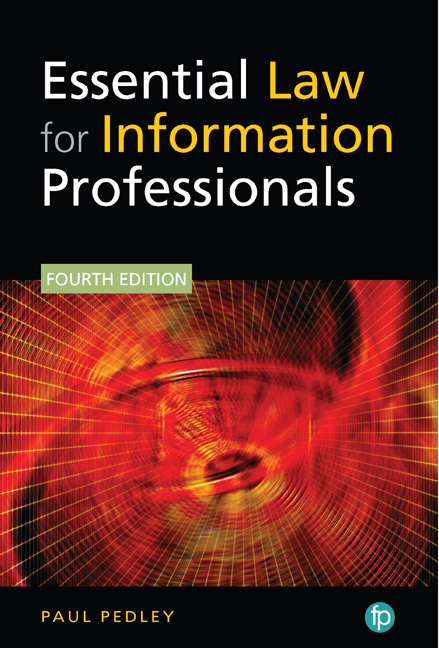Book contents
- Frontmatter
- Dedication
- Contents
- Disclaimer
- List of Figures and Tables
- Table of Statutes, Etc.
- Table of Cases
- Abbreviations
- Glossary of Terms
- Preface
- Chapter 1 General law and background
- Chapter 2 Library Law
- Chapter 3 Copyright
- Chapter 4 Legal Deposit
- Chapter 5 Breach of Confidence
- Chapter 6 Contracts and Licensing Agreements
- Chapter 7 Data Protection
- Chapter 8 Privacy
- Chapter 9 Freedom of Information
- Chapter 10 Human Rights
- Chapter 11 Re-use of Public Sector Information
- Chapter 12 Defamation
- Chapter 13 Professional Liability
- Chapter 14 Cybersecurity and Cybercrime
- Chapter 15 Disability Discrimination
- Chapter 16 Other Legal Issues Relevant to Librarians
- References
- Appendix 1 Brexit and the Orphan Works Exception
- Appendix 2 CILIP'S Ethical Framework
- Index
Chapter 9 - Freedom of Information
Published online by Cambridge University Press: 27 March 2020
- Frontmatter
- Dedication
- Contents
- Disclaimer
- List of Figures and Tables
- Table of Statutes, Etc.
- Table of Cases
- Abbreviations
- Glossary of Terms
- Preface
- Chapter 1 General law and background
- Chapter 2 Library Law
- Chapter 3 Copyright
- Chapter 4 Legal Deposit
- Chapter 5 Breach of Confidence
- Chapter 6 Contracts and Licensing Agreements
- Chapter 7 Data Protection
- Chapter 8 Privacy
- Chapter 9 Freedom of Information
- Chapter 10 Human Rights
- Chapter 11 Re-use of Public Sector Information
- Chapter 12 Defamation
- Chapter 13 Professional Liability
- Chapter 14 Cybersecurity and Cybercrime
- Chapter 15 Disability Discrimination
- Chapter 16 Other Legal Issues Relevant to Librarians
- References
- Appendix 1 Brexit and the Orphan Works Exception
- Appendix 2 CILIP'S Ethical Framework
- Index
Summary
General principles of freedom of information
United Nations General Assembly Resolution 59(i), which was passed at its first session on 14 December 1946, states that: ‘Freedom of information is a fundamental human right and is the touchstone of all the freedoms to which the United Nations is consecrated.’
The legal right to information is not limited to access to information laws, because each country has its own mix of legislation covering areas such as public records/archives, environmental protection, data protection and privacy, state secrets, and media.
Openness and transparency are now considered to be an essential part of any modern government. A UNESCO report says that ‘the number of member states with freedom of information laws has risen to 112, with especially strong growth in the Africa and Asia-Pacific regions’ (UNESCO, 2018).
An open government backed by a properly implemented and working freedom of information regime provides many benefits both to government bodies as well as to citizens. Freedom of information regimes exist in order to promote transparency and accountability. The public sector, by definition, is funded from the public purse and as such has a responsibility to demonstrate that it is held to account for that expenditure. Key benefits of a fully-fledged freedom of information system are:
• Participation in public debate.
• Improved administration and decision-making.
• Accountability in the spending of public money.
• Allowing the public to understand decisions made about them.
• Promoting public health and safety.
In addition to transparency and openness, freedom of information promotes a sense of accountability across the public sector. For example, details of expenditure on taxis, which were released as a result of an FOI request by Paul Hutcheon (Scottish political editor of the Sunday Herald), ultimately led to the resignation of the leader of the Scottish Conservative Party, David McLetchie. The information showed the MSP to have claimed unusually high travel expenses for an Edinburgh-based MSP. In the Westminster Parliament, the ‘expenses scandal’ of 2009 came about as a result of an FOI request made by Heather Brooke for details of a number of high-profile MPs’ expenses. Ms Brooke took the matter to the Information Tribunal and also to the High Court.
- Type
- Chapter
- Information
- Essential Law for Information Professionals , pp. 189 - 218Publisher: FacetPrint publication year: 2019



